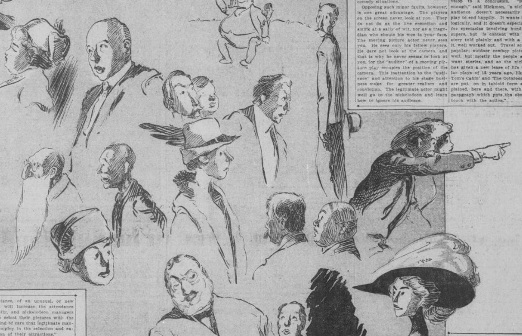Source: Alexander L. Pach, extract from ‘With the Silent Workers’, The Silent Worker, October 1919, p. 20
Text: Mrs. Terry, the famed Californian writer also has an article in The Nugget deploring the tendency of the deaf (and the hearing too) of going to the Movies and neglecting good books and other reading.
There’s another phase of the matter. We deaf people must thank the screen-art for the one biggest offset to our infirmity. Good pictures, and by good pictures I mean the kind that educate and elevate, are the levers that lift us from the deadly dullness and monotony of total deafness, to the highest pinnacles of delight. They restore our hearing as nothing else does. We know every word that is spoken as well as the hearing do, for they are all projected on the screen. We miss only the music, and this is such a slight loss it doesn’t count. Of course there is a great deal of trash shown on the screen, but we do need need to pay our money to see trash. All the best plays of the spoken stage that have delighted millions of hearing people find their way to “Screenland”, and such big hits as “Common Clay”, “Daddy Long-legs”, “The Thirteenth Chair”, “Secret Service” etc. etc., are ours through this media. An evening at a good picture house now means one of those hits of the drama; a News-Weekly that has the whole world for its field, and shows us one moment the great Pacific Fleet going through the Panama Canal; Andrew Carnegie as he was in life, and the last honors paid him when all that was mortal was laid to rest; General Pershing reviewing a parade in company with the King and Queen on England, General Haig and Admiral Beatty, and as they advertise it, twice a week “The World Before Your Eyes”. Then we have a more or less “funny” picture that makes us laugh whether we want to or not and then Burton Holmes shows us the people, the customs and the homes of some far away denizens of the other side of the earth. After an evening of delightful entertainment of this order one may go home utterly forgetful of the fact that an important sense is missing. He has come away refreshed. The tedium of the every day work of store, office of factory has been relieved in great measure, and we feel it’s a bully good little world after all, and that we are not so bad off – certainly all that puts cheer into otherwise dulled lives is most welcome joy. Of course one may have the Movie habit to excess, just as one might read too much, or more than he could assimilate, but I would not find fault with any deaf person for seeking and finding the joy of the cinema. Besides there is the old saw that has to do with meat being poison, and there you are. I do not suppose things are any different on the Pacific Coast from what they are here, but I find here that my fellow Movie Fans are the cream of the people. The deaf man in New York whose strong of college degrees is longest of all, gets there oftener than most any one else that I know of.
Take away the Movies from the Deaf, and you will take away a most prolific source of joy. A lot of money that used to be squandered on billiards, card-games and more harmful things now goes to the “movies” with profit to all concerned.
Comments: The Silent Worker was an American journal for the deaf, published 1888-1929. Most of its articles were written by hearing-impaired authors. The plays Common Clay, Daddy Long-Legs, The Thirteenth Chair and Secret Service were all filmed in the USA in 1919. The businessman and philanthropist Andrew Carnegie died in August 1919. Newsreels were commonly issued once or twice a week. Burton Holmes was a producer of film travelogues (a term that he coined).
Links: Copy at Gallaudet University Library (part of complete digitised archive of The Silent Worker)
